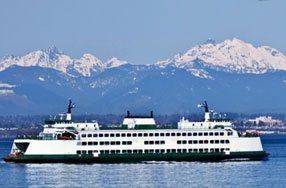NOT ALL LAW FIRMS ARE IN THE SAME BOAT
Defective or Unsafe Equipment on Washington State Ferries
Seattle Injury Lawyers for Defective or Unsafe Equipment on Ferries

As maritime injury lawyers representing Washington State ferry able-bodied seamen, ordinary seamen, engineers, officers, and galley workers, we understand how defective or unseaworthy equipment on the ferries can lead to serious injuries and change lives. For more than a combined 65 years, our maritime injury lawyers based in the maritime hub of Seattle, Washington have represented injured ferry workers in claims against Washington State Ferries and galley concessionaires following serious injuries from unsafe equipment. If you have questions about your claim, contact our award-winning lawyers for a free consultation. We are here to help.
Ferry Worker Claims for Unseaworthiness
Under general maritime law, the vessel and its equipment must be fit for its ordinary and intended purpose. If equipment fails or is unsafe, an injured ferry worker will be able to bring a claim for compensation. Compensation may include damages for pain and suffering, lost wages, lost earning capacity, past and future medical expenses, disability, loss of enjoyment of life and other damages.
Ferry Worker Claims Under the Jones Act
Similarly, a injured ferry worker can assert a claim for defective equipment under the Jones Act if the employer was aware of the unsafe condition of the equipment. While under general maritime law an injured worker is not required to show that the shipowner had notice of the defective equipment, the Jones Act requires proof of notice of the unsafe condition. The types of compensation available under the Jones Act and general maritime law largely overlap and injured ferry workers can establish entitlement to compensation under either the Jones Act or the doctrine of unseaworthiness in general maritime law.
Examples of defective or unsafe equipment may include: inadequate non-skid on a deck, a deck that is unreasonably slippery, a line that parts, a floor buffer that is not functioning properly, equipment that fails, a method of operation that is unsafe, a valve that is stuck, harmful fumes or gases, and many other conditions on the ferry. If you have questions about whether the condition that caused your injury qualifies you for compensation, contact us for a free claim evaluation. We will listen to the specific facts of your claim and provide our legal opinion about your right to compensation following a serious injury.
How is The Value of a Claim Determined?
There are two parts to any claim. First, the injured ferry or galley worker’s lawyer must show that the employer or vessel owner is liable for the injury. Liability is established by showing that the injury was caused by an unsafe condition, defective equipment, or the negligence of the employer or a co-worker. Second, once liability is established, the injured ferry or galley worker’s lawyer must demonstrate the amount of harm caused by the negligence or unsafe condition. This may include damages for economic losses and damages for non-economic losses like pain and suffering. While most cases are settled before a trial, the value of every claim is determined based on what both sides predict a judge or jury would award if the case were to proceed to trial. The parties may settle the case based on what they expect the outcome to be if a jury or judge heard the case. If the case does not settle, the parties will have a trial to determine the value of the claim. Have questions about the value of your claim? Contact our award-winning ferry and galley worker injury lawyers for a free case evaluation.







